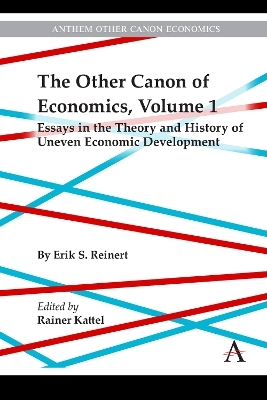
The Other Canon of Economics, Volume 1
Anthem Press (Verlag)
978-1-83998-297-2 (ISBN)
Other Canon Economics: Essays in the Theory and History of Uneven Economic Development brings together key essays on development economics from one of the most prolific and important development economists and historians of economic policy today. Erik S Reinert argues through essays ranging from 1994 to 2020 that neo-classical economics damages developing countries: the theory of comparative advantage leaves out a number of factors which make economic activities qualitatively different as carriers of economic growth. Based on a long intellectual tradition – started by the Italian economists Giovanni Botero (1589) and Antonio Serra (1613) and later used in virtually all presently industrialised countries – Reinert shows that the country which exports increasing returns goods – e.g. high-end manufacture and advanced services – has advantages over the country which exports diminishing returns goods – i.e. commodities. This has very important implications for today’s development strategies that, Reinert argues, should be seen as variations of industrial strategies.
Erik S. Reinert is Professor of Technology Governance and Development Strategies at Tallinn University of Technology and also chairman of The Other Canon Foundation in Norway. He holds a BA from Hochschule St. Gallen, Switzerland, an MBA from Harvard University, and a Ph.D. in economics from Cornell University. Lecturing in five languages, Reinert’s work has taken him to more than 65 different countries. His book How Rich Countries Got Rich…and Why Poor Countries Stay Poor has been published in more than 20 languages.
Introduction; 1 Catching-up from Way Behind. A Third World Perspective on First World History; 2 Recent Trends in Economic Theory — Implications for Development Geography, With Vemund Riiser; 3 A Schumpeterian Theory of Underdevelopment - A Contradiction in Terms?; 4 Competitiveness and Its Predecessors - A 500-Year Cross-national Perspective; 5 Diminishing Returns and Economic Sustainability: The Dilemma of Resource-based Economies under a Free Trade Regime; 6 Economics: ‘The Dismal Science’ or ‘The Never-ending Frontier of Knowledge’? On Technology, Energy and Economic Welfare; 7 Production Capitalism vs. Financial Capitalism – Symbiosis and Parasitism. An Evolutionary Perspective and Bibliography Bibliography by Arno Mong Daastøl; 8 Globalization in the Periphery as a Morgenthau Plan: The Underdevelopment of Mongolia in the 1990s; 9 Increasing Poverty in a Globalized World: Marshall Plans and Morgenthau Plans as Mechanisms of Polarization of World Incomes; 10 An Early National Innovation System: The Case of Antonio Serra’s 1613 Breve Trattato,
With Sophus A. Reinert; 11 Innovation Systems of the Past: Modern Nation-States in a Historical Perspective. The Role of Innovations and of Systemic Effects in Economic Thought and Policy, With Sophus A. Reinert; 12 The Other Canon: The History of Renaissance Economics, With Arno M. Daastøl; 13 Benchmarking Success: The Dutch Republic (1500–1750) as Seen by Contemporary European Economists; 14 Mercantilism and Economic Development: Schumpeterian Dynamics, Institution Building and International Benchmarking, With Sophus A. Reinert; 15 Development and Social Goals: Balancing Aid and Development to Prevent ‘Welfare Colonialism’
| Erscheinungsdatum | 19.07.2021 |
|---|---|
| Reihe/Serie | Anthem Other Canon Economics |
| Verlagsort | London |
| Sprache | englisch |
| Maße | 153 x 229 mm |
| Gewicht | 454 g |
| Themenwelt | Geschichte ► Teilgebiete der Geschichte ► Wirtschaftsgeschichte |
| Wirtschaft ► Volkswirtschaftslehre | |
| ISBN-10 | 1-83998-297-7 / 1839982977 |
| ISBN-13 | 978-1-83998-297-2 / 9781839982972 |
| Zustand | Neuware |
| Haben Sie eine Frage zum Produkt? |
aus dem Bereich


